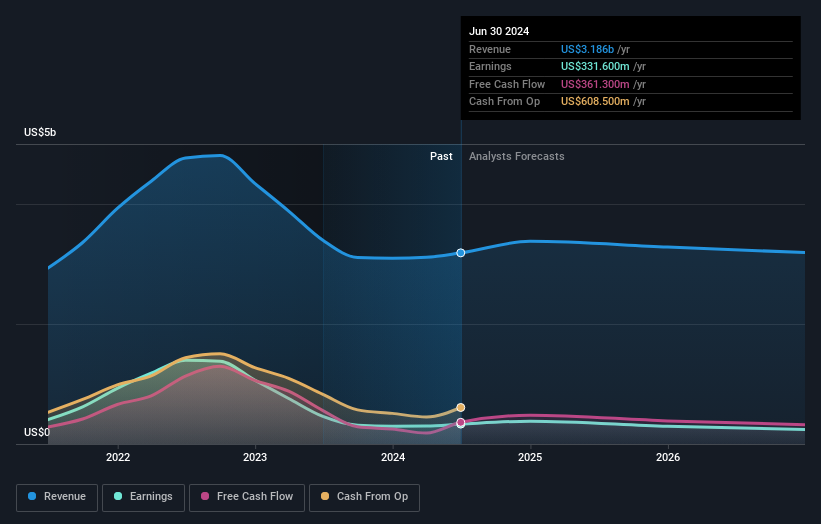- United States
- /
- Marine and Shipping
- /
- NYSE:MATX
Matson, Inc.'s (NYSE:MATX) institutional investors lost 3.4% over the past week but have profited from longer-term gains

Key Insights
- Given the large stake in the stock by institutions, Matson's stock price might be vulnerable to their trading decisions
- A total of 8 investors have a majority stake in the company with 50% ownership
- Insiders have been selling lately
A look at the shareholders of Matson, Inc. (NYSE:MATX) can tell us which group is most powerful. And the group that holds the biggest piece of the pie are institutions with 86% ownership. In other words, the group stands to gain the most (or lose the most) from their investment into the company.
No shareholder likes losing money on their investments, especially institutional investors who saw their holdings drop 3.4% in value last week. Still, the 53% one-year gains may have helped mitigate their overall losses. They should, however, be mindful of further losses in the future.
In the chart below, we zoom in on the different ownership groups of Matson.
Check out our latest analysis for Matson

What Does The Institutional Ownership Tell Us About Matson?
Institutional investors commonly compare their own returns to the returns of a commonly followed index. So they generally do consider buying larger companies that are included in the relevant benchmark index.
We can see that Matson does have institutional investors; and they hold a good portion of the company's stock. This can indicate that the company has a certain degree of credibility in the investment community. However, it is best to be wary of relying on the supposed validation that comes with institutional investors. They too, get it wrong sometimes. It is not uncommon to see a big share price drop if two large institutional investors try to sell out of a stock at the same time. So it is worth checking the past earnings trajectory of Matson, (below). Of course, keep in mind that there are other factors to consider, too.

Institutional investors own over 50% of the company, so together than can probably strongly influence board decisions. Hedge funds don't have many shares in Matson. Looking at our data, we can see that the largest shareholder is BlackRock, Inc. with 16% of shares outstanding. The Vanguard Group, Inc. is the second largest shareholder owning 11% of common stock, and Dimensional Fund Advisors LP holds about 7.2% of the company stock. Additionally, the company's CEO Matthew Cox directly holds 0.5% of the total shares outstanding.
We did some more digging and found that 8 of the top shareholders account for roughly 50% of the register, implying that along with larger shareholders, there are a few smaller shareholders, thereby balancing out each others interests somewhat.
Researching institutional ownership is a good way to gauge and filter a stock's expected performance. The same can be achieved by studying analyst sentiments. There are a reasonable number of analysts covering the stock, so it might be useful to find out their aggregate view on the future.
Insider Ownership Of Matson
While the precise definition of an insider can be subjective, almost everyone considers board members to be insiders. Company management run the business, but the CEO will answer to the board, even if he or she is a member of it.
I generally consider insider ownership to be a good thing. However, on some occasions it makes it more difficult for other shareholders to hold the board accountable for decisions.
We can see that insiders own shares in Matson, Inc.. The insiders have a meaningful stake worth US$90m. Most would see this as a real positive. If you would like to explore the question of insider alignment, you can click here to see if insiders have been buying or selling.
General Public Ownership
The general public-- including retail investors -- own 12% stake in the company, and hence can't easily be ignored. While this size of ownership may not be enough to sway a policy decision in their favour, they can still make a collective impact on company policies.
Next Steps:
While it is well worth considering the different groups that own a company, there are other factors that are even more important. For instance, we've identified 2 warning signs for Matson (1 is a bit concerning) that you should be aware of.
If you would prefer discover what analysts are predicting in terms of future growth, do not miss this free report on analyst forecasts.
NB: Figures in this article are calculated using data from the last twelve months, which refer to the 12-month period ending on the last date of the month the financial statement is dated. This may not be consistent with full year annual report figures.
New: Manage All Your Stock Portfolios in One Place
We've created the ultimate portfolio companion for stock investors, and it's free.
• Connect an unlimited number of Portfolios and see your total in one currency
• Be alerted to new Warning Signs or Risks via email or mobile
• Track the Fair Value of your stocks
Have feedback on this article? Concerned about the content? Get in touch with us directly. Alternatively, email editorial-team (at) simplywallst.com.
This article by Simply Wall St is general in nature. We provide commentary based on historical data and analyst forecasts only using an unbiased methodology and our articles are not intended to be financial advice. It does not constitute a recommendation to buy or sell any stock, and does not take account of your objectives, or your financial situation. We aim to bring you long-term focused analysis driven by fundamental data. Note that our analysis may not factor in the latest price-sensitive company announcements or qualitative material. Simply Wall St has no position in any stocks mentioned.
About NYSE:MATX
Matson
Engages in the provision of ocean transportation and logistics services.
Solid track record with excellent balance sheet and pays a dividend.


